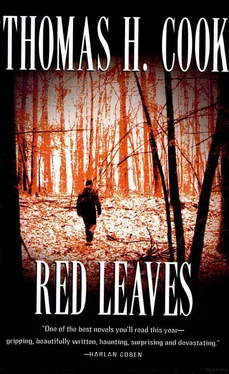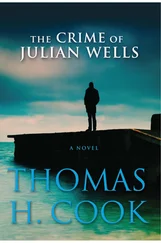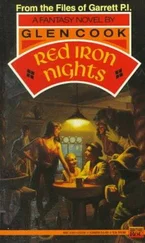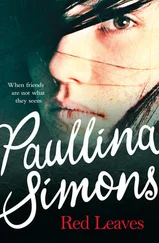"This is Keith," I told them as I ushered my son into the living room.
Both detectives rose and smiled and shook Keiths hand. Then they sat down on the green sofa, Keith opposite them in a wooden rocker.
"You don't have to stay," Peak said to Meredith. He looked at me. "You, either, Mr. Moore. This is just a friendly chat." He smiled. "If it were any more serious than that, we'd be reading Keith here his rights." He glanced at Keith and the smile broadened. "Just like they do on TV, right?"
Keith nodded slightly.
"I'd rather stay with my son," I said.
Meredith opted to busy herself in her small office at the rear of the house, however, and so it was just three men and a teenage boy in the living room when the questioning began.
Then, almost immediately, it was over, with little more established than what I'd already told Vince Giordano, that Keith had not left Amy alone in her house, that he'd gotten home a little before midnight. The only new facts were that my son had walked from Amy's house into the village, then along its back streets, and finally over to the ball field where he'd sat alone on the bleachers for a time, then gotten up and walked home. At no time during this late-night sojourn had he talked to anyone. He'd called home at just before ten, he said. I'd answered the phone and he'd told me that he intended to stay out a little later than usual. I'd asked if he needed a ride, and he'd assured me that he didn't. At that point, he and I had agreed that he was to be home before midnight. Which, he told Kraus and Peak, he had been. The exact time, he said, was seven minutes before twelve. He knew this because he'd glanced at the large grandfather clock in the front foyer before going upstairs to his room.
As I listened to Keith's answers, I began to relax. Nothing Keith said surprised me and nothing contradicted my own understanding of his movements and activities that night.
"So," Kraus said, "after you hung around the ball field for a while, you went straight home?"
"Yes."
"The ball field is only a few blocks from the Giordanos' house, isn't it?"
"Yes."
"Did you pass their house again?"
"No."
"You went straight home," Peak said, "Like DO NOT PASS GO?"
Keith chuckled, but mirthlessly, a laugh I heard as a mocking response to Peak's reference.
And so it didn't surprise me that Peak's attitude immediately hardened. "How'd you get home?"
"I walked."
Peak's eyes were very still. "You walked?"
"Yes," Keith answered.
"You don't have a car?" Kraus asked.
"No," Keith said. "I couldn't drive anyway. I'm fifteen."
"You have a learner's permit?" Peak asked.
"Yes."
"How did you get to Amy's house?"
"My uncle drove me."
Kraus took a notebook from his jacket pocket. "What's your uncle's name?"
Keith looked at me as if asking if he should answer.
"His name is Warren," I said. "Warren Moore."
"Where does he live?" Kraus asked.
"1473 Barrow Street."
"Near the school," Peak said. "The elementary school."
"Yes," I said. "Right next door, actually."
"Where does he work?"
"He works on his own. He paints houses."
Kraus jotted something in his notebook, then returned his attention to Keith. "So your uncle drove you to Amy's house, and then, after Mr. and Mrs. Giordano came back home, you walked to town—have I got that right?"
"Yes."
"And then you went to the ballfield, and after that you walked home?"
"Yes."
"All the way from the center of town?"
Keith nodded.
"You didn't get a ride?"
Kraus asked.
Keith shook his head. "No."
"But you could have called home, right, gotten a lift?"
"Sure."
"Why didn't you?" Peak asked.
"I just didn't," Keith answered. "I don't mind walking."
"Even that late?" Kraus asked.
"No," Keith answered. He thrust his head backward and ran his fingers through the tangles of his hair. "I like the night," he said.
SIX
I like the night.
Odd how sinister a simple remark can sound, the questions it can suddenly raise.
In what way, I wondered, did my son like the night? Did he like it because it brought him a certain peace? Or did he like it simply because it meant the end of another tedious day at school or at home? Or did he like it because it shielded him from view, because, clothed in its darkness, he could skulk about unnoticed, hidden beneath the hood of the blue parka? Did he like it like a saint in search of solitude or like a stalker in search of cover?
It didn't matter really. What mattered was that my son had gotten through it, so that it might end here, a hope I fully embraced as I walked the two detectives to their car.
Kraus got in behind the wheel, but Peak remained standing at the passenger door. He wore a dark green suit, and in the slant of bright sunlight that washed over him, he looked like a thick shrub.
"Mr. Moore," he said, "what is your experience with your son?"
"Experience?" I asked.
"In your exchanges, I mean. Day to day."
"I still don't quite..."
"Has he been truthful?" Peak asked.
Suddenly, I thought of the two beams of light sweeping across the ragged undergrowth and recalled that only moments before, Keith had said that he had not been driven home the night before. Was that true? I wondered now. But despite that jarring vision and its accompanying doubt, I said, "As far as I know, he's always told me the truth."
Peak watched me closely. "About everything?"
"Well, I'm sure he's told a few little lies to me over the years," I said. "He's a kid, that's all. A little enclosed, but—" The look in Peak's eyes stopped me in my tracks. "But normal," I added quickly. "A teenager, that's all."
"Yes, of course," Peak said.
He tried to appear perfectly satisfied by my answer, but I knew he wasn't. "Well, thank you," he said. "We'll call if we need anything further."
With that he settled into the passenger seat and the car pulled away.
Meredith was washing the detectives' coffee cups when I returned to the house, her movements strangely frantic, almost violent, like someone trying to erase an incriminating stain.
"Well, that was easier than I expected," I told her.
"They'll be back," Meredith said.
Her certainty surprised me. "Why are you so sure of that?"
She had been facing the sink, her back to me, but now she whirled around. "Because something always comes up, Eric." There was a fire in her eyes, a sense that she was talking about more than Keith's connection, whatever it might be, to Amy Giordano's disappearance.
"What do you mean?"
"To spoil things"—her expression took on an indecipherable combination of anger and sadness, like someone mourning a death by freak accident—"when things were so perfect."
"Nothing is spoiled," I said in a gentle, comforting tone, pleased that our life had seemed so perfect to her until now. "Meredith, we don't even know what happened to Amy yet."
She glanced away, settled her gaze briefly on the woods outside the window, two small birds in a hanging feeder. "I just feel this terrible sinking," she said softly.
I came over to her and drew her into my arms. Her body was stiff and brittle, a bundle of sticks. "Nothing is sinking," I assured her.
She shook her head. "I'm just afraid, that's all. Afraid that it's all going to ... explode."
With that, she stepped out of my embrace and made her way up the stairs. I made no effort to follow her. It wouldn't have done any good anyway. Under stress, Meredith preferred being alone, at least in brief intervals. There was something about solitude that calmed her, and so I left her to herself, walked out into the yard, sat beside the brick grill, and tried to reason through my impulsive decision to say nothing to the police or even to Keith about my oddly building suspicion that he'd lied to them. Even then, I wasn't sure why I'd done it, save that I'd found no way to address the matter without either drawing Keith deeper into suspicion or grilling him myself, an action I wanted to delay as long as possible in the hope that Amy would suddenly turn up safe and sound, and so there would be no need for me to confront Keith at all. It was an illusion that couldn't be justified, or even maintained for very long, and I should have known that at the time. Since then I've learned that half of life is denial, that even in those we love, it's not what we see but what we choose to be blind to that sustains us.
Читать дальше












